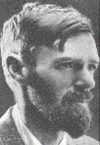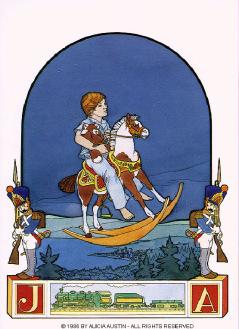|
Text 1
The Rocking-horse Winner[I]
About the author:
 David Herbert Lawrence was born in 1885 in
Eastwood, Nottinghamshire, the fourth child of Arthur Lawrence
and Lydia Beardsall. After attending Beauvale Board School
he won a scholarship to Nottingham High School. On leaving
school in 1901 he was employed for a short time as a clerk
at the Nottingham firm of Haywards, manufacturers of surgical
appliances, and from 1902 as a pupil teacher at the British
School in Eastwood. He attended the Pupil-Teacher Centre in
Ilkeston from 1904 and in 1906 took up a teacher-training
scholarship at University College, Nottingham. After qualifying
in 1908 he took up a teaching post at the Davidson School
in Croydon, remaining there until 1912.
David Herbert Lawrence was born in 1885 in
Eastwood, Nottinghamshire, the fourth child of Arthur Lawrence
and Lydia Beardsall. After attending Beauvale Board School
he won a scholarship to Nottingham High School. On leaving
school in 1901 he was employed for a short time as a clerk
at the Nottingham firm of Haywards, manufacturers of surgical
appliances, and from 1902 as a pupil teacher at the British
School in Eastwood. He attended the Pupil-Teacher Centre in
Ilkeston from 1904 and in 1906 took up a teacher-training
scholarship at University College, Nottingham. After qualifying
in 1908 he took up a teaching post at the Davidson School
in Croydon, remaining there until 1912.
In early 1912, after a period of serious illness, Lawrence
left his teaching post at Croyden to return to Nottinghamshire,
shortly afterwards eloping to Germany with Frieda Weekley,
the wife of Professor Ernest Weekley. They returned to England
in 1914 prior to the outbreak of war and were married at Kensington
Register Office on 14 July. Confined to England during the
war years, the Lawrences spent much of this time at Tregerthen
in Cornwall. In 1919 they left England once more, embarking
on a period of extensive travelling within Europe and then
further afield to Ceylon, Australia, Mexico and New Mexico.
His health continued to deteriorate and Lawrence returned
to Europe with Frieda in 1925. During his last years Lawrence
spent much of his time in Italy making only brief visits to
England, the last in 1926. He died on 2 March 1930 at Vence
in the south of France.
Lawrence was a prolific writer - of poetry, novels, short
stories, plays, essays, and criticism. His works are heavily
autobiographical and the experiences of his early years in
Nottinghamshire continued to exert a profound influence throughout
his life.
About the story
D. H. Lawrence's The Rocking Horse Winner, in which a child
has nothing he can use but his own life force to save his
weak mother, is a story bound like a mummy into its inevitabilities.
The first sentence declares the fate already tunneling beneath
this family to suck one of them under: There was a woman
who was beautiful, who started with all the advantages, yet
she had no luck.
The Rocking-horse Winner is a short story in which money
is a symbol of the substitution of love and affection, a rocking
horse, of sex and isolation, Paul, of civilized man.
 The story seems to be a children's story,
but it is extremely philosophical. The value of the story
lies in the moral it teaches. The story seems to be a children's story,
but it is extremely philosophical. The value of the story
lies in the moral it teaches.
Language notes:
1.Although
they lived in style, they felt always an anxiety in the house.
In style means fashionable.
e.g. When they
got married they decided to do it in style, and gave a big
party.
2.There
was always the grinding sense of the shortage of money, though
the style was always kept up.
The grinding sense: the heavy sense.
3.She
racked her brain, and tried this things and the other.
To rack one's brain means to think very deeply and
for a long time
4.Gets
on without all right?
Gets on really without a name?
5.Bassett
was serious as a church: Basset was very serious.
6.Say,
Paul, old man, do you ever put anything on a horse?
To put any thing on a horse means to use some money to bet
on a horse.
7.honor
bright: to be serious.
8.Basset
keeps it for me: Basset keeps the money for me.
9.the
fiver: a five-pound notes.
Text 2
The Rocking-Horse Winner[II]
Language notes:
1.Lively
Spark came in first, and the betting had been ten to one against
him.
Came in first: the first place winner.
The betting had been ten to one means the odd had
been ten to one.
2.So
she'll have a birthday present of a thousand pounds for five
successive years.
Successive: following each another closely.
3. When there were no visitors, Paul now took his meals with
his parents, as he was beyond the nursery control.
As he was beyond the nursery control: because he is no longer
taken care of by the nurse.
4.odd
knack: strange ability of doing something.
5.Eton:伊顿公学.
6.Lincoln:The
Derby and the Lincoln are famous horse-racings in England.
7.She
went to bed as right as a trivet.
As right as a trivet:
perfectly.
The trivet is a metallic plate-stand with three legs.
8.To
the good: with a profit of.
9.To the bad:
in debt by.
TOP
|
